Exploring Codes of Ethics: Healthcare Scenarios and Ethical Dilemmas
VerifiedAdded on 2023/03/17
|5
|1242
|20
Essay
AI Summary
This essay delves into the critical codes of ethics governing healthcare professionals, with a specific focus on nursing practices. It emphasizes the paramount importance of patient confidentiality, illustrated through a real-world scenario where a breach of privacy occurred, highlighting the lessons learned and the need for proactive measures to safeguard patient information. The essay further explores the significance of continuous professional development, advocating for the acquisition of new skills and knowledge through education, consultation, and mentorship to improve patient outcomes. Additionally, the essay examines the importance of working within the scope of one's expertise, responsible delegation of tasks, and the crucial role of informed consent in empowering patients to actively participate in their care. Finally, the essay underscores the significance of maintaining professional conduct, including appropriate attire and respectful communication, to uphold the dignity of both the profession and the patients.
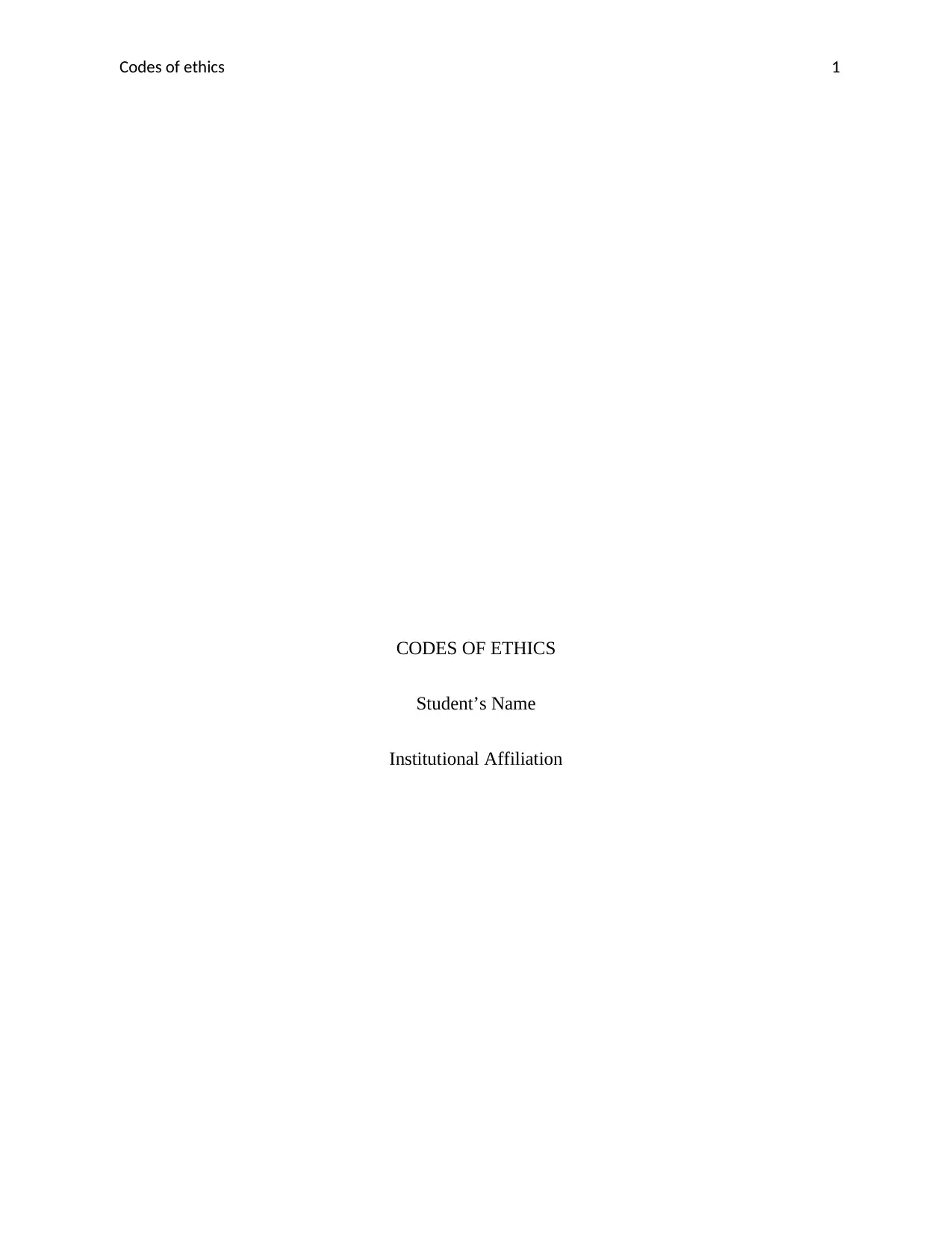
Codes of ethics 1
CODES OF ETHICS
Student’s Name
Institutional Affiliation
CODES OF ETHICS
Student’s Name
Institutional Affiliation
Paraphrase This Document
Need a fresh take? Get an instant paraphrase of this document with our AI Paraphraser
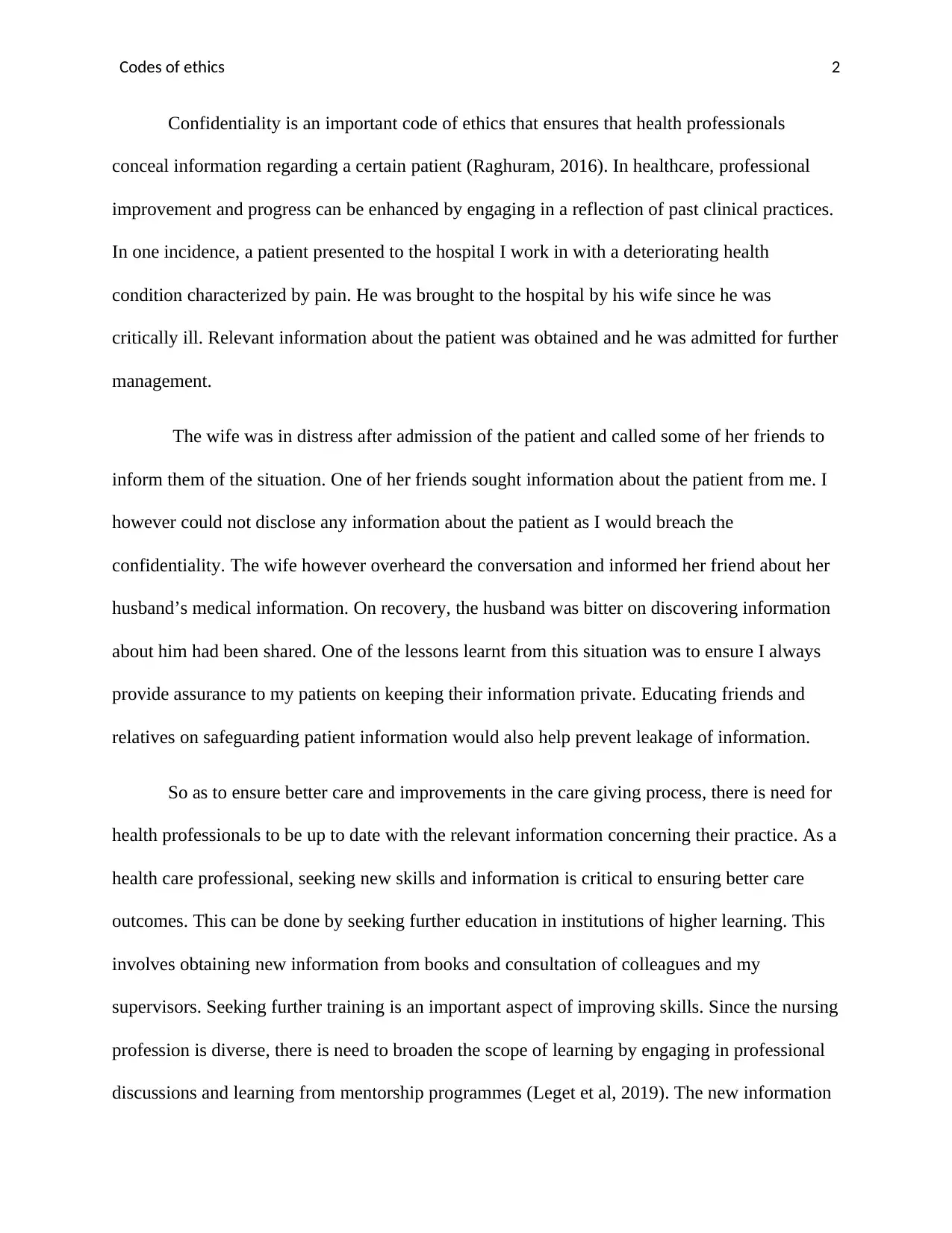
Codes of ethics 2
Confidentiality is an important code of ethics that ensures that health professionals
conceal information regarding a certain patient (Raghuram, 2016). In healthcare, professional
improvement and progress can be enhanced by engaging in a reflection of past clinical practices.
In one incidence, a patient presented to the hospital I work in with a deteriorating health
condition characterized by pain. He was brought to the hospital by his wife since he was
critically ill. Relevant information about the patient was obtained and he was admitted for further
management.
The wife was in distress after admission of the patient and called some of her friends to
inform them of the situation. One of her friends sought information about the patient from me. I
however could not disclose any information about the patient as I would breach the
confidentiality. The wife however overheard the conversation and informed her friend about her
husband’s medical information. On recovery, the husband was bitter on discovering information
about him had been shared. One of the lessons learnt from this situation was to ensure I always
provide assurance to my patients on keeping their information private. Educating friends and
relatives on safeguarding patient information would also help prevent leakage of information.
So as to ensure better care and improvements in the care giving process, there is need for
health professionals to be up to date with the relevant information concerning their practice. As a
health care professional, seeking new skills and information is critical to ensuring better care
outcomes. This can be done by seeking further education in institutions of higher learning. This
involves obtaining new information from books and consultation of colleagues and my
supervisors. Seeking further training is an important aspect of improving skills. Since the nursing
profession is diverse, there is need to broaden the scope of learning by engaging in professional
discussions and learning from mentorship programmes (Leget et al, 2019). The new information
Confidentiality is an important code of ethics that ensures that health professionals
conceal information regarding a certain patient (Raghuram, 2016). In healthcare, professional
improvement and progress can be enhanced by engaging in a reflection of past clinical practices.
In one incidence, a patient presented to the hospital I work in with a deteriorating health
condition characterized by pain. He was brought to the hospital by his wife since he was
critically ill. Relevant information about the patient was obtained and he was admitted for further
management.
The wife was in distress after admission of the patient and called some of her friends to
inform them of the situation. One of her friends sought information about the patient from me. I
however could not disclose any information about the patient as I would breach the
confidentiality. The wife however overheard the conversation and informed her friend about her
husband’s medical information. On recovery, the husband was bitter on discovering information
about him had been shared. One of the lessons learnt from this situation was to ensure I always
provide assurance to my patients on keeping their information private. Educating friends and
relatives on safeguarding patient information would also help prevent leakage of information.
So as to ensure better care and improvements in the care giving process, there is need for
health professionals to be up to date with the relevant information concerning their practice. As a
health care professional, seeking new skills and information is critical to ensuring better care
outcomes. This can be done by seeking further education in institutions of higher learning. This
involves obtaining new information from books and consultation of colleagues and my
supervisors. Seeking further training is an important aspect of improving skills. Since the nursing
profession is diverse, there is need to broaden the scope of learning by engaging in professional
discussions and learning from mentorship programmes (Leget et al, 2019). The new information
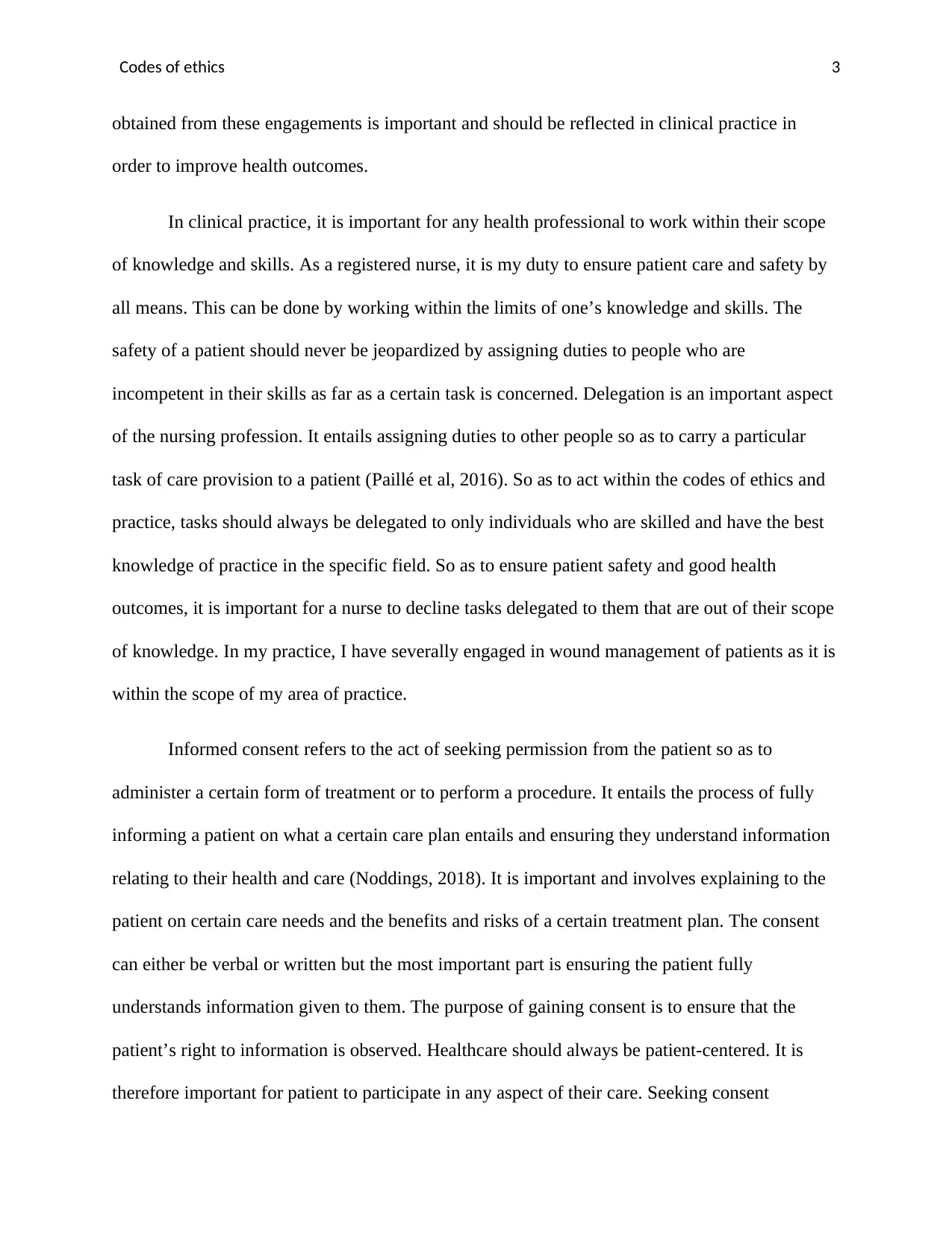
Codes of ethics 3
obtained from these engagements is important and should be reflected in clinical practice in
order to improve health outcomes.
In clinical practice, it is important for any health professional to work within their scope
of knowledge and skills. As a registered nurse, it is my duty to ensure patient care and safety by
all means. This can be done by working within the limits of one’s knowledge and skills. The
safety of a patient should never be jeopardized by assigning duties to people who are
incompetent in their skills as far as a certain task is concerned. Delegation is an important aspect
of the nursing profession. It entails assigning duties to other people so as to carry a particular
task of care provision to a patient (Paillé et al, 2016). So as to act within the codes of ethics and
practice, tasks should always be delegated to only individuals who are skilled and have the best
knowledge of practice in the specific field. So as to ensure patient safety and good health
outcomes, it is important for a nurse to decline tasks delegated to them that are out of their scope
of knowledge. In my practice, I have severally engaged in wound management of patients as it is
within the scope of my area of practice.
Informed consent refers to the act of seeking permission from the patient so as to
administer a certain form of treatment or to perform a procedure. It entails the process of fully
informing a patient on what a certain care plan entails and ensuring they understand information
relating to their health and care (Noddings, 2018). It is important and involves explaining to the
patient on certain care needs and the benefits and risks of a certain treatment plan. The consent
can either be verbal or written but the most important part is ensuring the patient fully
understands information given to them. The purpose of gaining consent is to ensure that the
patient’s right to information is observed. Healthcare should always be patient-centered. It is
therefore important for patient to participate in any aspect of their care. Seeking consent
obtained from these engagements is important and should be reflected in clinical practice in
order to improve health outcomes.
In clinical practice, it is important for any health professional to work within their scope
of knowledge and skills. As a registered nurse, it is my duty to ensure patient care and safety by
all means. This can be done by working within the limits of one’s knowledge and skills. The
safety of a patient should never be jeopardized by assigning duties to people who are
incompetent in their skills as far as a certain task is concerned. Delegation is an important aspect
of the nursing profession. It entails assigning duties to other people so as to carry a particular
task of care provision to a patient (Paillé et al, 2016). So as to act within the codes of ethics and
practice, tasks should always be delegated to only individuals who are skilled and have the best
knowledge of practice in the specific field. So as to ensure patient safety and good health
outcomes, it is important for a nurse to decline tasks delegated to them that are out of their scope
of knowledge. In my practice, I have severally engaged in wound management of patients as it is
within the scope of my area of practice.
Informed consent refers to the act of seeking permission from the patient so as to
administer a certain form of treatment or to perform a procedure. It entails the process of fully
informing a patient on what a certain care plan entails and ensuring they understand information
relating to their health and care (Noddings, 2018). It is important and involves explaining to the
patient on certain care needs and the benefits and risks of a certain treatment plan. The consent
can either be verbal or written but the most important part is ensuring the patient fully
understands information given to them. The purpose of gaining consent is to ensure that the
patient’s right to information is observed. Healthcare should always be patient-centered. It is
therefore important for patient to participate in any aspect of their care. Seeking consent
⊘ This is a preview!⊘
Do you want full access?
Subscribe today to unlock all pages.

Trusted by 1+ million students worldwide
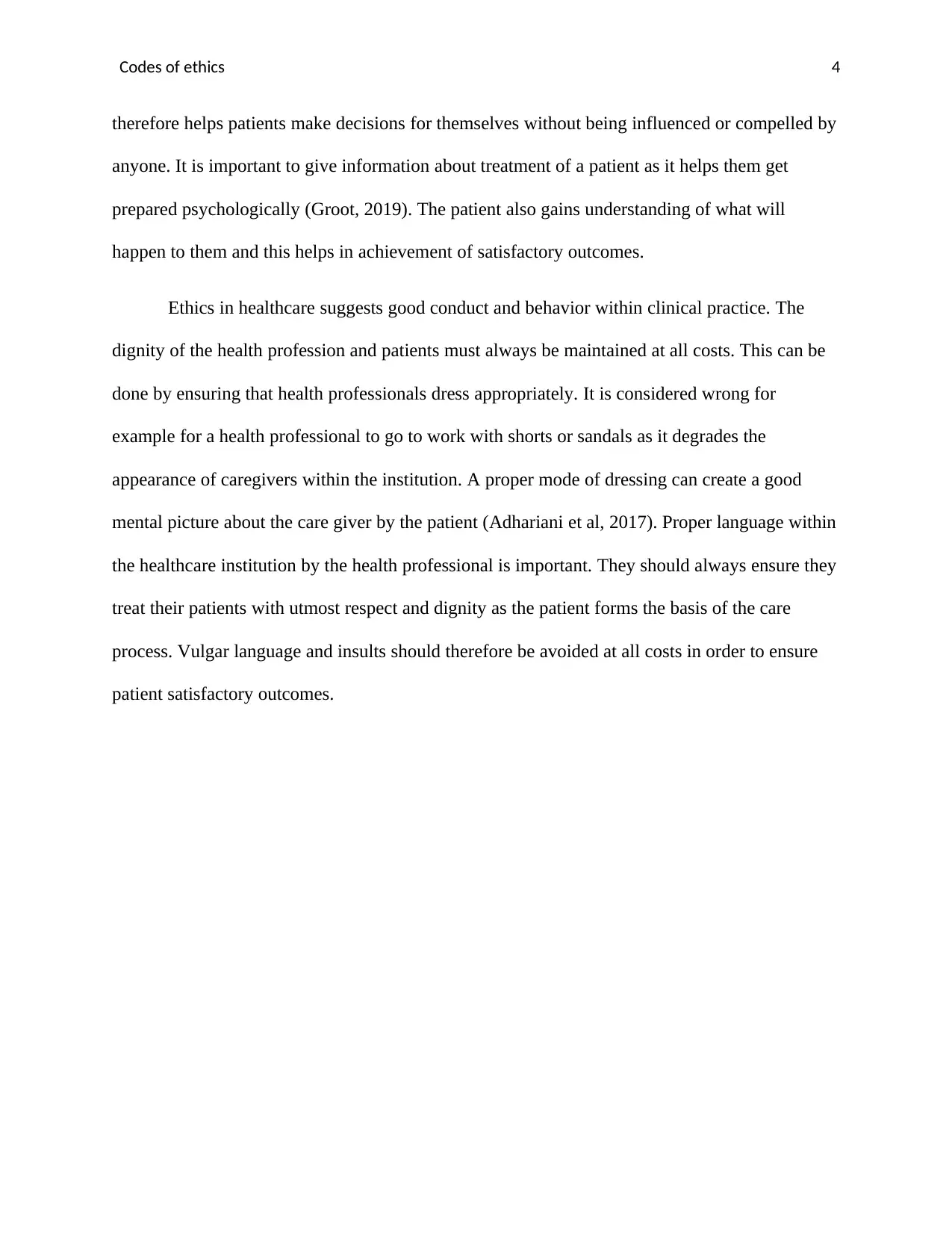
Codes of ethics 4
therefore helps patients make decisions for themselves without being influenced or compelled by
anyone. It is important to give information about treatment of a patient as it helps them get
prepared psychologically (Groot, 2019). The patient also gains understanding of what will
happen to them and this helps in achievement of satisfactory outcomes.
Ethics in healthcare suggests good conduct and behavior within clinical practice. The
dignity of the health profession and patients must always be maintained at all costs. This can be
done by ensuring that health professionals dress appropriately. It is considered wrong for
example for a health professional to go to work with shorts or sandals as it degrades the
appearance of caregivers within the institution. A proper mode of dressing can create a good
mental picture about the care giver by the patient (Adhariani et al, 2017). Proper language within
the healthcare institution by the health professional is important. They should always ensure they
treat their patients with utmost respect and dignity as the patient forms the basis of the care
process. Vulgar language and insults should therefore be avoided at all costs in order to ensure
patient satisfactory outcomes.
therefore helps patients make decisions for themselves without being influenced or compelled by
anyone. It is important to give information about treatment of a patient as it helps them get
prepared psychologically (Groot, 2019). The patient also gains understanding of what will
happen to them and this helps in achievement of satisfactory outcomes.
Ethics in healthcare suggests good conduct and behavior within clinical practice. The
dignity of the health profession and patients must always be maintained at all costs. This can be
done by ensuring that health professionals dress appropriately. It is considered wrong for
example for a health professional to go to work with shorts or sandals as it degrades the
appearance of caregivers within the institution. A proper mode of dressing can create a good
mental picture about the care giver by the patient (Adhariani et al, 2017). Proper language within
the healthcare institution by the health professional is important. They should always ensure they
treat their patients with utmost respect and dignity as the patient forms the basis of the care
process. Vulgar language and insults should therefore be avoided at all costs in order to ensure
patient satisfactory outcomes.
Paraphrase This Document
Need a fresh take? Get an instant paraphrase of this document with our AI Paraphraser
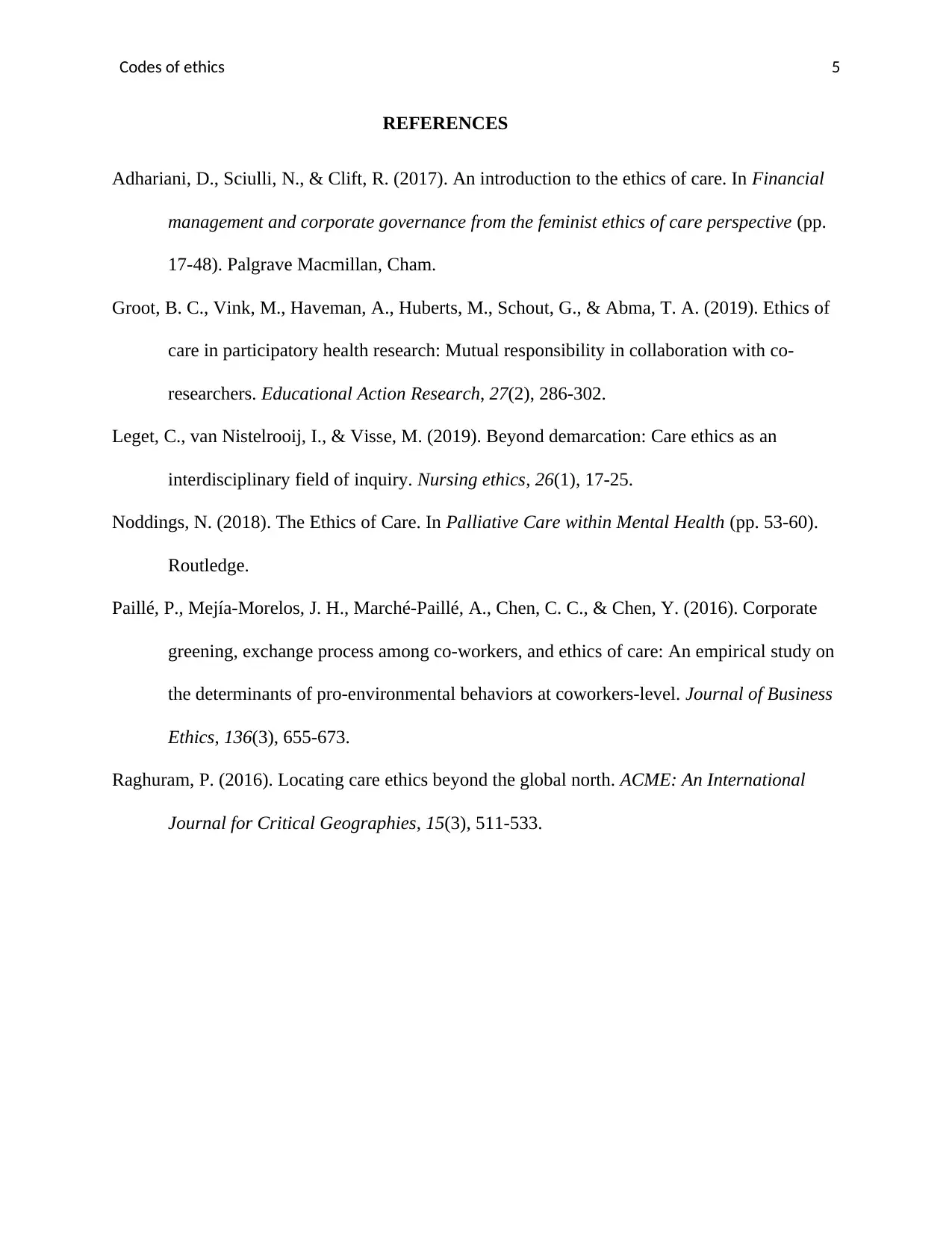
Codes of ethics 5
REFERENCES
Adhariani, D., Sciulli, N., & Clift, R. (2017). An introduction to the ethics of care. In Financial
management and corporate governance from the feminist ethics of care perspective (pp.
17-48). Palgrave Macmillan, Cham.
Groot, B. C., Vink, M., Haveman, A., Huberts, M., Schout, G., & Abma, T. A. (2019). Ethics of
care in participatory health research: Mutual responsibility in collaboration with co-
researchers. Educational Action Research, 27(2), 286-302.
Leget, C., van Nistelrooij, I., & Visse, M. (2019). Beyond demarcation: Care ethics as an
interdisciplinary field of inquiry. Nursing ethics, 26(1), 17-25.
Noddings, N. (2018). The Ethics of Care. In Palliative Care within Mental Health (pp. 53-60).
Routledge.
Paillé, P., Mejía-Morelos, J. H., Marché-Paillé, A., Chen, C. C., & Chen, Y. (2016). Corporate
greening, exchange process among co-workers, and ethics of care: An empirical study on
the determinants of pro-environmental behaviors at coworkers-level. Journal of Business
Ethics, 136(3), 655-673.
Raghuram, P. (2016). Locating care ethics beyond the global north. ACME: An International
Journal for Critical Geographies, 15(3), 511-533.
REFERENCES
Adhariani, D., Sciulli, N., & Clift, R. (2017). An introduction to the ethics of care. In Financial
management and corporate governance from the feminist ethics of care perspective (pp.
17-48). Palgrave Macmillan, Cham.
Groot, B. C., Vink, M., Haveman, A., Huberts, M., Schout, G., & Abma, T. A. (2019). Ethics of
care in participatory health research: Mutual responsibility in collaboration with co-
researchers. Educational Action Research, 27(2), 286-302.
Leget, C., van Nistelrooij, I., & Visse, M. (2019). Beyond demarcation: Care ethics as an
interdisciplinary field of inquiry. Nursing ethics, 26(1), 17-25.
Noddings, N. (2018). The Ethics of Care. In Palliative Care within Mental Health (pp. 53-60).
Routledge.
Paillé, P., Mejía-Morelos, J. H., Marché-Paillé, A., Chen, C. C., & Chen, Y. (2016). Corporate
greening, exchange process among co-workers, and ethics of care: An empirical study on
the determinants of pro-environmental behaviors at coworkers-level. Journal of Business
Ethics, 136(3), 655-673.
Raghuram, P. (2016). Locating care ethics beyond the global north. ACME: An International
Journal for Critical Geographies, 15(3), 511-533.
1 out of 5
Related Documents
Your All-in-One AI-Powered Toolkit for Academic Success.
+13062052269
info@desklib.com
Available 24*7 on WhatsApp / Email
![[object Object]](/_next/static/media/star-bottom.7253800d.svg)
Unlock your academic potential
Copyright © 2020–2026 A2Z Services. All Rights Reserved. Developed and managed by ZUCOL.





